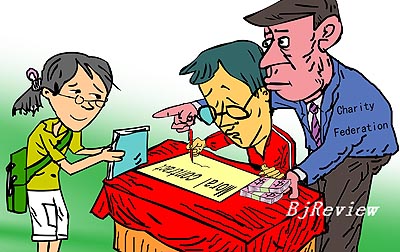|

The commonly held belief among most people is that acts of charity are carried out with no thought of getting something in return, or of attaching conditions to those who receive donations. It's perhaps for this reason that events surrounding the Henan Charity Federation's recent decision to add an agenda to students' financial aid caused such a public outcry. Students who receive financial aid from the federation are required to sign a "donation relay" commitment, which demands that, when they have graduated and have stable employment, they must return the same amount of money they received to help other poor students.
Yang Degong, Executive Vice President of the Henan Charity Federation, said that, since the organization was founded in 2001, it has always taken "assisting impoverished college students" as an important part of its charity work. However, the federation found that a number of students felt no gratitude for the financial aid, something that deeply hurt the donors. To ask those receiving donations to help other students is a way of developing gratitude at a heartfelt level, Yang said.
According to the federation, the "returned donation" will not fall into the hands of original donors, but will be given to other poor students. If all recipients do this, the federation can have a stable source of funds. Officials with the federation point out that the commitment is not compulsory. Even if the recipients do not return the full amount they were given, their names are not made public and there is no deadline for returning aid money.
Despite all the explanations surrounding the commitment, some people still feel that asking recipients to sign a contract before getting a donation goes against the principle of charity.
Learning to be grateful
Gao Junbo (Beijing Morning Post): Nowadays we are seeing some college students default educational loans, as a result of which their names are blacklisted by banks and their alma maters. The "donation relay" commitment is not compulsory, but it relies heavily on the students' self-discipline. It shows good faith in today's college students, despite the fact that so few have faith in them.
The commitment does not demand students return the same amount of money they have received, nor does the Henan Charity Federation ask for anything for itself. What the federation asks students to do is to make a donation of not less than what they have received once they have stable employment. The donation, based on free will, converts former aid recipients to donors. The satisfaction from helping others is unmatched by any other feeling and will encourage the students to do more good for society.
Lu Guowei (Dahe Daily): According to the Contract Law, conditions can be attached to a donation and when there are attached conditions, the recipients should fulfill the obligations according to the contract. If the recipients fail to fulfill the task, the donation can be withdrawn.
Charity offerings are a special form of donation, so it can be attached with or without conditions, as long as the conditions conform to laws. Even if there are no explicit terms, in accordance with the nature of charity donations, donors have the right to directly ask recipients, or to ask relevant charity institutions, to ensure recipients are aware of the goal of the endowments.
In this sense, the attached "donation relay" commitment, which asks aid recipients to in turn help others, will help the development of charity in China.
Zheng Genling (China Youth Daily): To do good deeds without asking for returns reflects a high level of moral integrity, but it does not mean that donors should never ask for something in return.
As long as donors do not make use of charity donations to commit crimes, their behavior cannot be criticized. Therefore, there is nothing wrong in asking recipients to write to donors, reporting on their school life and expressing gratitude, and even signing a "donation relay" commitment.
In my opinion, what poses a threat to the development of charity is not this commitment, but ingratitude and indifference by student recipients.
Nowadays, people tend to be tough with donors and sympathize with recipients. People believe that as long as they have taken the side of the disadvantaged group, they have the right to criticize the upper class. However, who can tell if all donors are rich? Some donors are themselves struggling in life. All those who have contributed aid to those who are in need deserve respect instead of suspicion.
| 